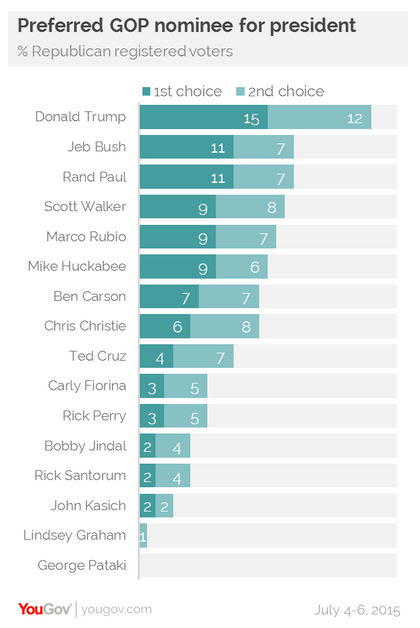The Republican Party is currently in a twist over the presidential candidacy of real estate mogul and political opportunist Donald Trump, and it’s not because GOP officials are concerned that he might win the party’s nomination. They’re not. What they are worried about is what happens when he loses.
Trump has used his high name recognition and ability to capture media attention, along with a willingness to pander to bigotry and nativism, to generate early support, and he’s done it with great success. But an Economist/YouGov.com poll released Thursday highlights both Trump’s strengths and his fatal weaknesses as a GOP candidate. In a field of 16 candidates, the poll finds Trump solidly in the lead with 15 percent of registered Republican voters naming him as their preferred nominee. Former Florida Gov. Jeb Bush and Sen. Rand Paul (R-KY) are tied for second place with 11 percent.
Related: Trump Won’t ‘Tone It Down’ – Doubles Down on Insults
The poll asked respondents not just who their preferred candidate was, but also who their second choice would be. And for Trump, those numbers look even better. An additional 12 percent of respondents picked him as their No. 2, putting him well ahead of his closest rivals.
But while those numbers make Trump look like a strong contender, there is a ceiling to his support that suggests he won’t be able to galvanize a large percentage of the party as the field thins out. Less than half of Republicans surveyed (49 percent) said that they have a favorable impression of Trump, and 43 percent have an unfavorable opinion of him.
Further, when asked who they thought the eventual nominee would be regardless of their own personal preference, Bush led decisively, with 29 percent of the vote compared to Paul’s 12 percent. Trump dropped to fifth place with 7 percent.
Why then are Republican officials worried about Trump to the point that Republican National Committee Chairman Reince Priebus this week reached out to him personally to ask him to “tone it down” with regard to his attacks on immigrants.
Related: Can’t Stop, Won’t Stop – Trump Attacks Mexicans Again
Trump actually presents a cocktail of concerns for the GOP. The most immediate worry is that he will turn the upcoming series of Republican primary debates into a circus. He now seems all but certain to qualify for one of the 10 slots that Fox News says it will make available for the opening debate on Aug. 6.
With such a large cast of characters and limited time, the debate almost by necessity will become a contest to produce the most memorable zingers and sound bites. Trump has shown little in the way of restraint, or shame, in his public comments so far, and would appear to have a natural advantage over more buttoned-down candidates in such a forum.
Second is the concern that Trump will become the new face of the GOP among the Hispanic voters the party has been trying to mend its relationship with. The anti-immigration frenzy of last summer, combined with the death of comprehensive immigration reform legislation and scorched earth opposition to President Obama’s executive actions on immigration, have left the party a tough road to walk with the fastest-growing demographic in the country. Having candidate Trump on television spewing invective about Mexicans being “rapists” and “murderers” doesn’t help.
Finally, there’s the concern about what happens when it becomes apparent to Trump that he’s not going to win the GOP nomination. He has the money and the ego to strike out on his own as an independent candidate, and he might be able to take a non-trivial percentage of Republican voters with him.
Related: Ted Cruz on Donald Trump – I ‘Salute’ Him
He wouldn’t be doing it to win the presidency so much as to punish the party that rejected him by cutting a few percentage points off eventual nominee’s vote tally in an election that could be decided by a small margin.
Yes, it would be incredibly petty and spiteful. But spend a few minutes perusing Trump’s Twitter feed or his Instagram page. He actually is incredibly petty and spiteful.
There is precedent for third party candidates throwing a wrench in presidential elections. In 1992, billionaire Ross Perot ran as an independent and grabbed 19 percent of the vote. Though political scientists doubt that his candidacy changed the outcome of the election, many Republicans still blame him for preventing George H.W. Bush from winning a second term in the White House and paving the way for President Bill Clinton.
Related: Running Out of Allies — The Mad Rush to Dump Trump
In 2000, Ralph Nader’s Green Party candidacy arguably peeled off enough Democratic votes to put George W. Bush in the White House over Al Gore, with an assist from the Supreme Court.
Trump, in an interview with the Washington Examiner earlier this week, appeared to set aside the possibility of running independently of the GOP. “My sole focus is to run as a Republican,” he told reporter Byron York, “because of the fact that I believe that is the best way we can defeat the Democrats.”
Whether presidential spoiler is a realistic future role for The Donald is unclear. Kyle Kondik, managing editor of Sabato’s Crystal Ball at the University of Virginia’s Center on Politics, pointed out that the political dynamics of 2016 are not the same as they were several election cycles ago.
“Voters are highly partisan these days, and arguments that voters would be ‘wasting’ votes on third party candidates would be potent, especially for Republicans who recoil at the thought of another Clinton presidency,” he said.
But Trump is nothing if not a wild card, Kondik acknowledged.
“Ultimately, who knows?” he said. “Trump does seem to love the attention.”
Top Reads from The Fiscal Times:





